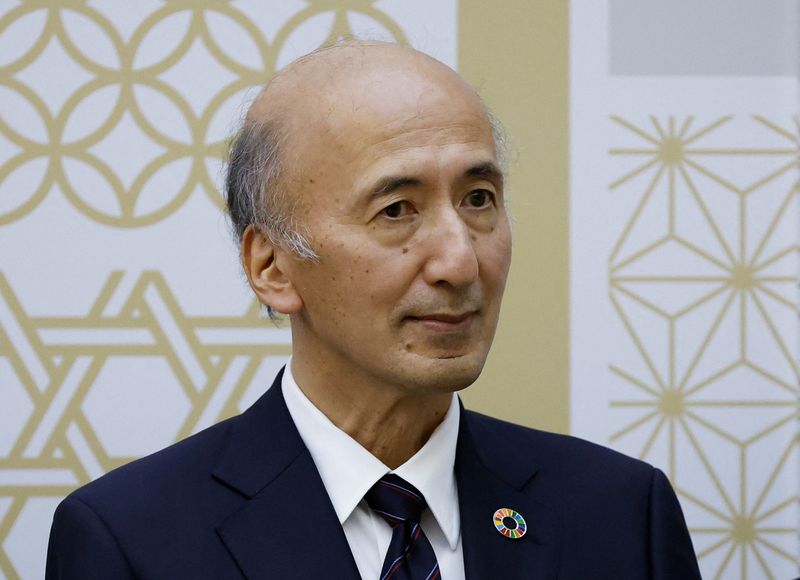By Tetsushi Kajimoto and Leika Kihara
TOKYO (Reuters) - The Bank of Japan's leadership race came under renewed market scrutiny after Hiroshi Nakaso, seen as a strong contender to become next governor, said he has taken up a post heading an Asia-Pacific Economic Cooperation (APEC) advisory council.
While it was unclear how Nakaso's move may affect the nomination of next BOJ governor, it comes at a time when Prime Minister Fumio Kishida's administration is intensifying its search for a successor to incumbent Governor Haruhiko Kuroda.
"I'm a member of ABAC, APEC's Business Advisory Council, private-sector panel, which will handle the issue of transition finance. I'm going to serve as the chairman of a task force to deal with financial issues," Nakaso told a fintech symposium late on Thursday.
"I'll do my best to achieve valuable outcomes," said Nakaso, who is also chairman of the Organization of Global Financial City Tokyo, a group of public and private entities working to raise Tokyo's profile as a financial hub.
He made no mention on monetary policy or the process to choose the next central bank governor.
The remarks led some market players to bet that Nakaso, who people close to him say was enjoying life outside the BOJ, had dropped out from the central bank leadership race.
A career central banker who served as deputy governor until 2018, Nakaso has repeatedly warned of the drawbacks of prolonged monetary easing such as the distortion its huge presence could create in bond and money markets.
"It's hard to believe Nakaso will be nominated as next BOJ governor, after he announced that he has taken up an important international role," said Ryutaro Kono, chief economist at BNP Paribas (OTC:BNPQY) and a veteran BOJ watcher.
Kuroda has said he will not seek re-appointment once his second, five-year term ends on April 8. His two deputies will also see their terms end on March 19.
AMAMIYA REMAINS MARKET FAVOURITE
Markets are closely watching the BOJ succession race for clues on how soon the central bank could phase out Kuroda's radical stimulus programme, as inflation perks up and markets creak under the weight of the BOJ's huge asset purchases.
Nakaso is considered more hawkish on monetary policy than incumbent BOJ Deputy Governor Masayoshi Amamiya, who is also seen by markets as a top contender to become next governor.
A choice of former BOJ deputy governor Hirohide Yamaguchi, also considered a candidate, may be the most market-moving as he has recently called for abandoning the bank's bond yield cap.
Finance Minister Shunichi Suzuki declined to comment, when asked at a briefing on Friday whether Nakaso's assuming the ABAC job has heightened the chance Amamiya will become next BOJ governor.
"Nothing has been confirmed," Suzuki said.
Noriatsu Tanji, chief bond strategist at Mizuo Securities, said the chance of Nakaso becoming next BOJ governor was now just 5%. He sees a 40% chance of Amamiya getting the job, followed by a 30% possibility that it will go to Yamaguchi.
"If Amamiya was chosen, the initial reaction would be for interest rates to fall somewhat, as it would give markets the reaction the BOJ's current policy will be sustained," he said.

The government is expected to present its nominee for the next BOJ governor to parliament this month.
ABAC is a private-sector advisory council consisting of business executives that submits proposals to the APEC summit, which is chaired by the United States this year.